- Stat Significant
- Posts
- Which Shows Got Their Finale Right, and Which Didn't? A Statistical Analysis
Which Shows Got Their Finale Right, and Which Didn't? A Statistical Analysis
A data-centric study of TV endings.
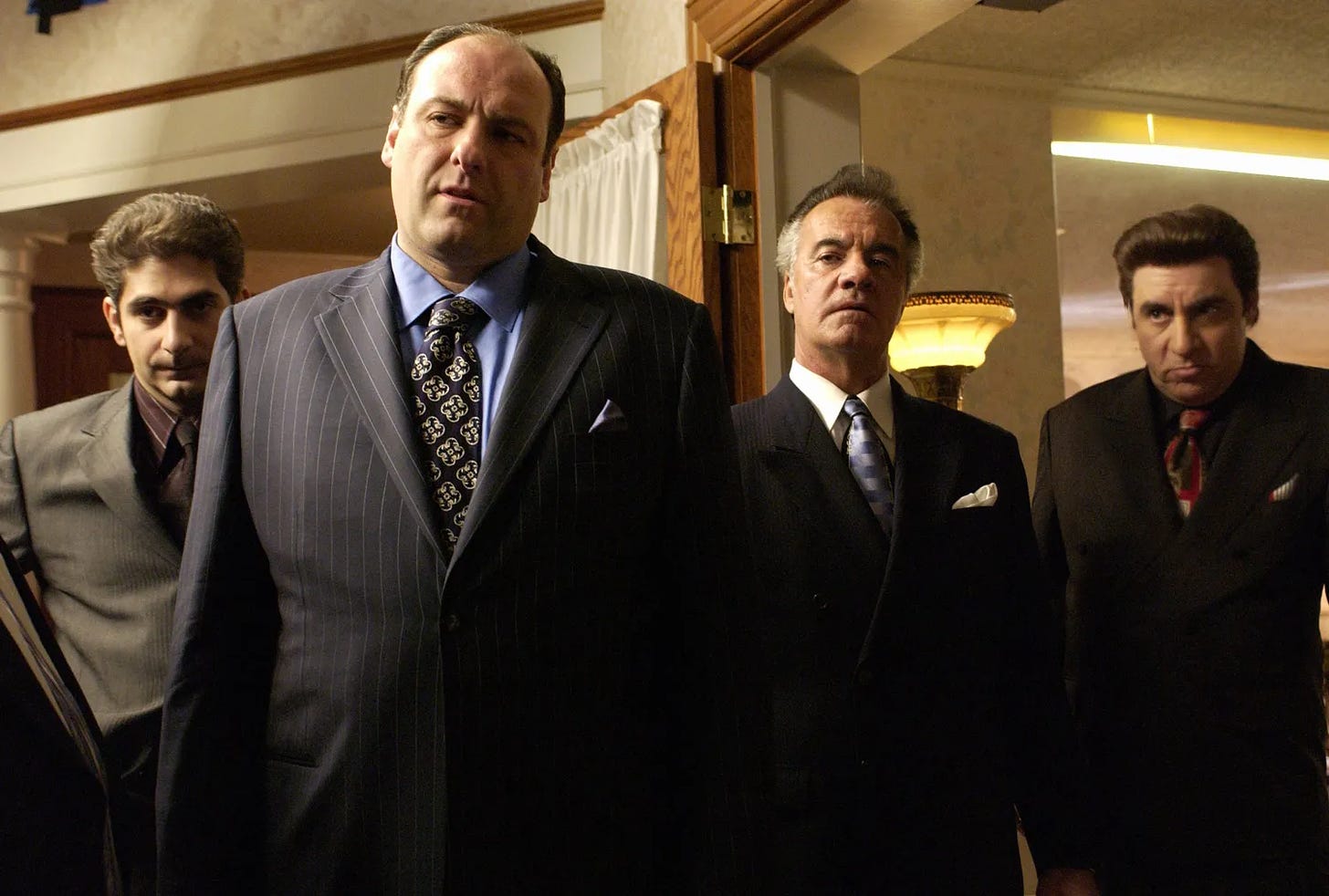
The Sopranos (1999). Credit: HBO.
Intro: The Beginning of Modern Endings
The Sopranos' finale is infamous for its infamy. After eight years of transformational premium-quality television, the series ended on an abrupt and highly-ambiguous fade to black. In advance of the finale, distributors, wary of the show's distinctive conclusion, cautioned cable providers about the potential for viewer complaints, fearing fans might mistakenly believe their cable service had failed. To this day, The Sopranos’ conclusion is arguably the most controversial and widely discussed episode in television history.
The Sopranos' ending set a new standard for high-quality programming in the emerging era of peak TV. As the first modern television finale, it was groundbreaking for several reasons, including:
Being One of the First Shows Embraced by the Internet: Premiering in 1999, The Sopranos was one of the earliest programs to be debated and dissected online, a fact that amplified the controversy and conversation surrounding the series' conclusion. In the Internet age, online discourse would come to dominate television fandom and content discovery as social media flourished and consumers migrated to streaming services.
Intricate Serialized Storytelling: TV's early history was marked by an episodic approach to storytelling, with each episode a self-contained narrative. Toward the end of the 20th century, shows like The Sopranos and The Wire popularized serialized storylines, with plots running across multiple episodes, creating a need for a conclusive series send-off honoring a myriad of highly complex subplots.
Lack of Closure: Modern audiences generally expected well-planned, satisfying conclusions, especially for shows with long-running story arcs. The Sopranos defied such a convention, presenting a new approach to finality (or lack thereof).
In the 16 years since The Sopranos ended, viewers and critics have increasingly recognized the finale's effectiveness—after all, we're still talking about it a decade and a half later.
Since The Soprano's debut in 1999, television has morphed from a time-wasting medium devoid of artistic merit to the epicenter of modern entertainment. Shows are discussed, disputed, and scrutinized ad naseum, and finales can cement a show's greatness (Breaking Bad) or forever tarnish its legacy (Game of Thrones).
So today, we'll explore the transcendent finales that epitomize the outstanding heights of peak TV, the bungled conclusions that highlight the pitfalls of serialized content, and broader trends surrounding television endings over the last fifty years.
Methodology: How to Quantify an Ending
An implicit contract exists between television shows and their viewership—give the series your time, and it'll provide a rewarding emotional payoff. A show's concluding episode is the capstone to this arrangement. If successful, the series' ending should satisfy or exceed viewer expectations.
To determine the reception of a series finale, we'll compare the final episode's average user rating from IMDB to the average score of all episodes from non-final seasons. Take the following shows as an example:

Breaking Bad's final episode wowed audiences, with an average rating 12.3% above the average score from its first four seasons. On the other hand, Dexter's conclusion left viewers widely dissatisfied, with its finale scoring 45% below prior installments.
After sorting through the results, I identified four distinct patterns in how audiences react to a TV show's finale:
Transcendent Finales: the best of the best.
Saitsyfing Finales: endings that more or less meet viewer expectations.
Disappointing Finales: a conclusion that falls short of previously established show quality but is not so bad as to retroactively render prior viewership a waste of time.
Disaster Finales: an ending that is so terrible it begs the question, "What were the writers thinking?"
We'll explore the most popular shows that elicit each type of reaction, showcasing the programs with the highest number of IMDB series ratings, and then analyze the trends associated with these finales.
1. Transcendent Finales: The Best of the Best

Breaking Bad (2008). Credit: AMC.
What Makes a Finale Transcendent?
Transcendent finales leave audiences buzzing and retroactively elevate the quality of the entire series. These endings honor the show's previous storylines and character arcs while somehow introducing something novel to top previous installments.
Criteria for a Transcendent Finale:
Shows with a final episode rating above 9.4 or 10% greater than the average for all previous seasons.

Some Observations From Our List of Transcendent Finales:
Breaking Bad is Perfectly Good: According to IMDB users, both Breaking Bad and its spin-off Better Call Saul deliver near-perfect finales, a testament to showrunner Vince Gilligan's brilliance. Breaking Bad's ending is an astounding culmination of Walter White's slow-building yet radical 52-episode transformation from Mr. Chips to Scarface.
The Sopranos Finale Has Aged Like Fine Wine: Given the commotion surrounding its initial airing, I was surprised to see The Sopranos’ finale on this list. Perhaps the emotional resonance of this once-idiosyncratic ending has grown over time.
Comedies End Well: Some of the highest-profile comedies of the last twenty years, including The Office, The Big Bang Theory, Modern Family, Community, and Brooklyn Nine-Nine, produced widely acclaimed finales. This accomplishment is surprising, given the genre's focus on character over plot. I guess you don't need long-running, highly complex storylines to provide a gratifying conclusion.
2. Satisfying Finales: Good But Not Great

House (2004). Credit: NBCUniversal Television.
What Makes a Finale Satisfying?
Satisfying finales reward fans for their dedication but aren't so mind-blowing as to recontextualize viewer affinity for the entire series. You watch the episode, think to yourself, "That was nice," and continue on with your day.
Criteria for a Satisfying Finale:
Shows with a -3% to 10% ratings difference between the final episode and the average for all previous seasons.
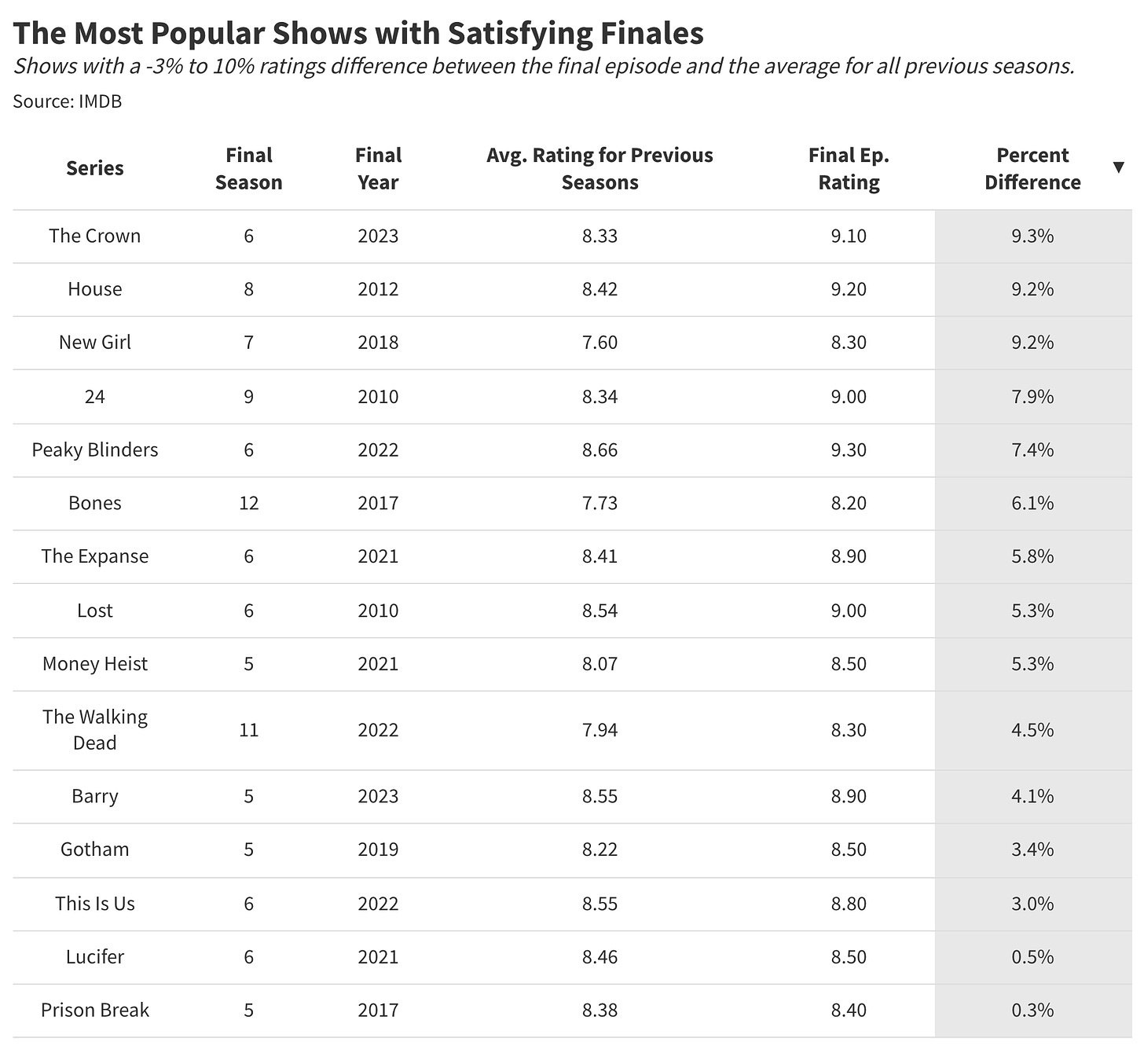
Some Observations From Our List of Satisfying Finales:
How Did Lost Make this List???: Having designed this exercise, I'm obligated to present my findings as dictated by my Python script. I haven't watched Lost, but I've endured the internet's excessive complaints about this show and its lack of closure for over twenty years. Has this series been good the entire time (is that the real twist)? Is the internet just really complain-y?
Where Are All the Streaming Shows?: Except for The Crown, Money Heist, and Peaky Blinders, all of these shows were developed for cable (with Barry developed for premium cabler HBO). Streaming services have been producing content at an absurd rate over the last ten years—why is their representation scarce on these lists? Have not enough of these shows ended? Are there too many streaming series for a single show to absorb disproportionate attention (and IMDB ratings)? Netflix is known for ending series with little notice and no planned conclusion—maybe finales are a luxury in the streaming age.
Need Help with a Data Project?
Enjoying the article thus far and want to chat about data and statistics? Need help with a data or research project? Well, you’re in luck because Stat Significant offers data science and data journalism consulting services. Reach out if you’d like to learn more.
Email [email protected]
3. Disappointing Finales: Bad But Not Terrible
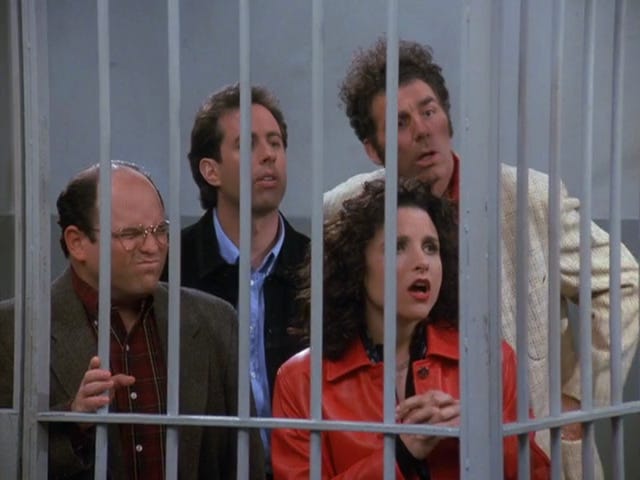
Seinfeld (1989). Credit: Sony Pictures Television.
What Makes a Finale Disappointing?
These finales fall short of prior quality but not so much as to ruin one's day or appreciation for past episodes.
Criteria for a Disappointing Finale:
Shows with a -10% to -3% ratings difference between the final episode and the average for all previous seasons.
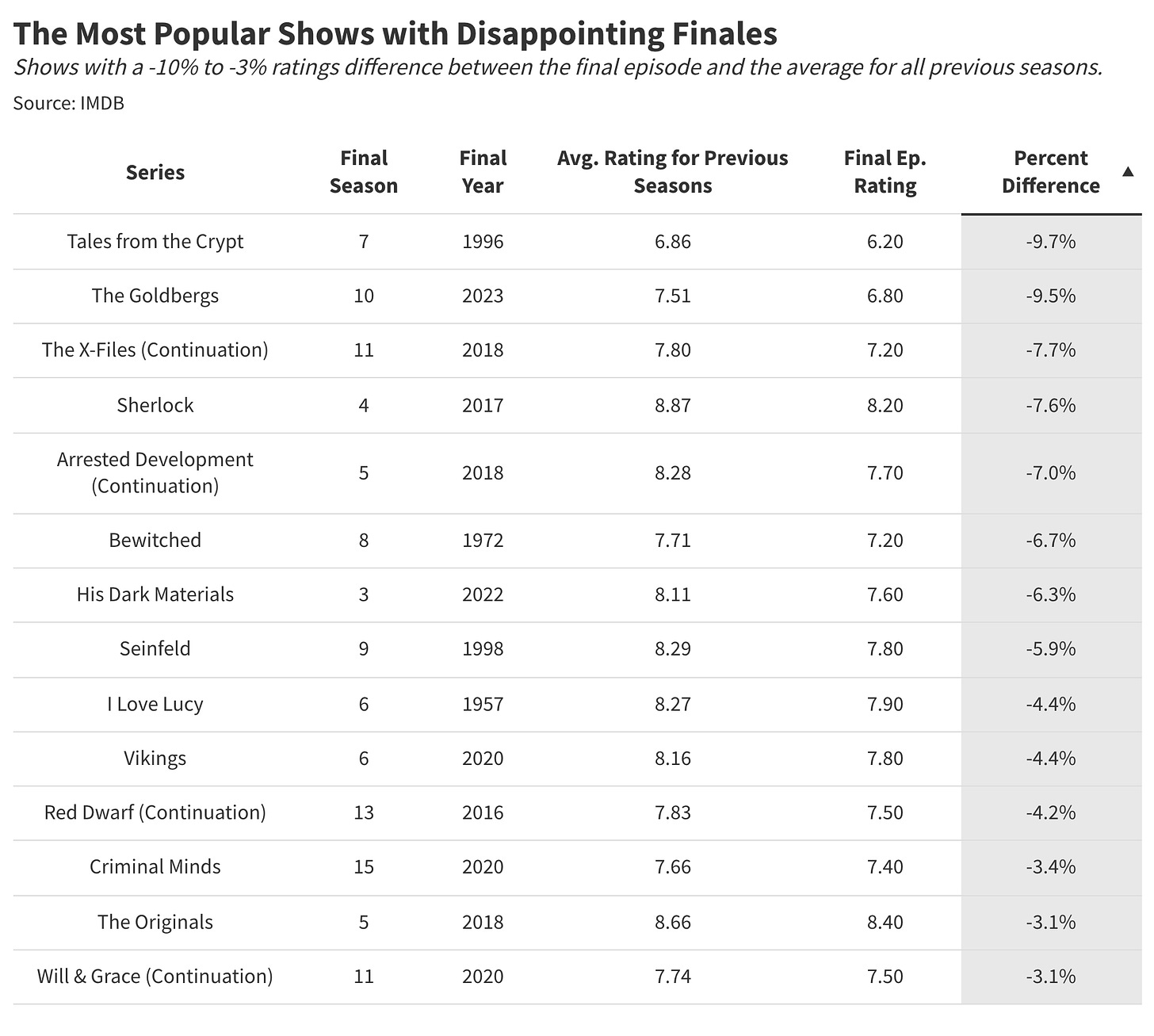
Some Observations From Our List of Disappointing Finales:
The Nothingness of Seinfeld: Is it surprising that a self-professed "show about nothing" had an unsatisfying conclusion? Seinfeld's ending is deliberately anti-climactic, sequestering Jerry and his friends in jail due to a random good samaritan law. There is nothing special or conclusive about Seinfeld's finale episode.
Reboots Yield Poor Results: Rebooted installments of Arrested Development, The X-Files, Will & Grace, and Red Dwarf produced finales unworthy of each show's first run. I can't think of a television reboot that has reproduced or outshined a series' foremost iteration.
Older Shows Struggled with Endings: Unlike previous lists, this group showcases a handful of finales from the 20th century, including I Love Lucy and Bewitched. TV storytelling was episodic in its early years, with each episode presenting a standalone narrative. Audiences couldn't "catch up" if they missed previous episodes because there was no Tivo, preventing writers from developing meaningful arcs across seasons. Ultimately, this robbed shows of consequential endings, making their conclusions play as random.
4. Disaster Finales: So Terrible It Hurts

Game of Thrones (2011). Credit: HBO.
What Makes a Finale a Disaster?
These endings make you wish you had never cared for the show in the first place. If you could get in a time-traveling DeLorean, go back in time, and undo your decision to repeatedly watch this series, you would.
Criteria for a Disaster Finale:
Shows with a -10% or less ratings difference between the final episode and the average for all previous seasons.
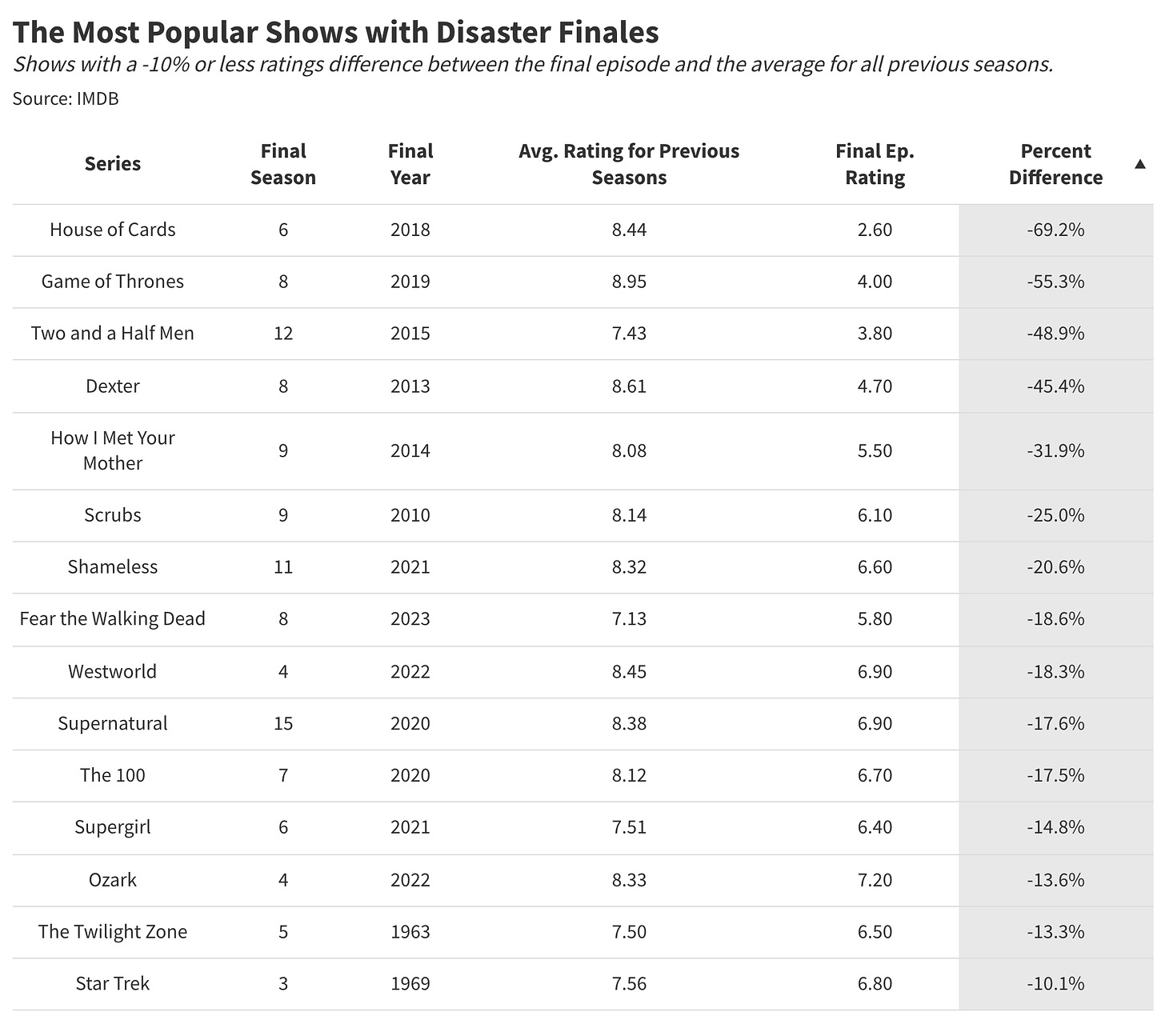
Some Observations From Our List of Disaster Finales:
Game of Thrones and How I Met Your Mother Still Make Me Angry: Before dazzling you with insight, I will air a grievance (two grievances, actually). Just seeing the titles of these two shows boils my blood. Game of Thrones ran for 73 one-hour episodes, while How I Met Your Mother produced 208 30-minute episodes. Combined, that's 177 hours of my time wasted by these dumpster fire finales.
Losing the Main Character is a Bad Thing: I've covered this topic in previous posts. Unsurprisingly, show quality suffers when a series loses its main character. Absent their leading actor, the final seasons of House of Cards, Scrubs, and Two and a Half Men are poor imitations of prior installments. Financially, it makes sense to have these shows limp through their final season, while artistically, it's highly unfortunate.
Longevity and Quality Are Not the Same Thing: 43% of transcendent shows and 33% of satisfying shows on our lists ended in season 7 or later. Compare these figures to our disappointing and disaster finales, with 57% and 60% of listed shows concluding in season 7 or later, respectively. Many long-running shows can "jump the shark," losing earlier seasons' narrative intensity and ingenuity in later installments. One of my earliest posts explored the average point at which show quality typically degrades, finding this inflection point to be around season six.
High-Level Finale Trends: Are Endings Getting Better Over Time?
Amid the intense competition of the streaming wars, show quality and viewer satisfaction are as important as ever. To end a show well is to generate positive word of mouth, which yields more subscriptions. How many potential viewers have been deterred from subscribing to HBO for Game of Thrones after hearing about the show's disappointing finale? Probably a non-trivial amount.
So, have shows gotten better at ending in recent years, or has the win-at-all-costs content explosion of the streaming wars eroded quality?
Over the last sixty years, finale quality has drastically improved, with the percentage of disappointing final episodes significantly decreasing and the share of satisfying and transcendent conclusions increasing.

At the same time, there has been a noticeable decline in finale quality during the early years of the 2020s, marked by a slight increase in episodes deemed disastrous or disappointing. But this quality degradation isn't limited to show finales, as there has been a subtle decrease in overall television quality since 2018.
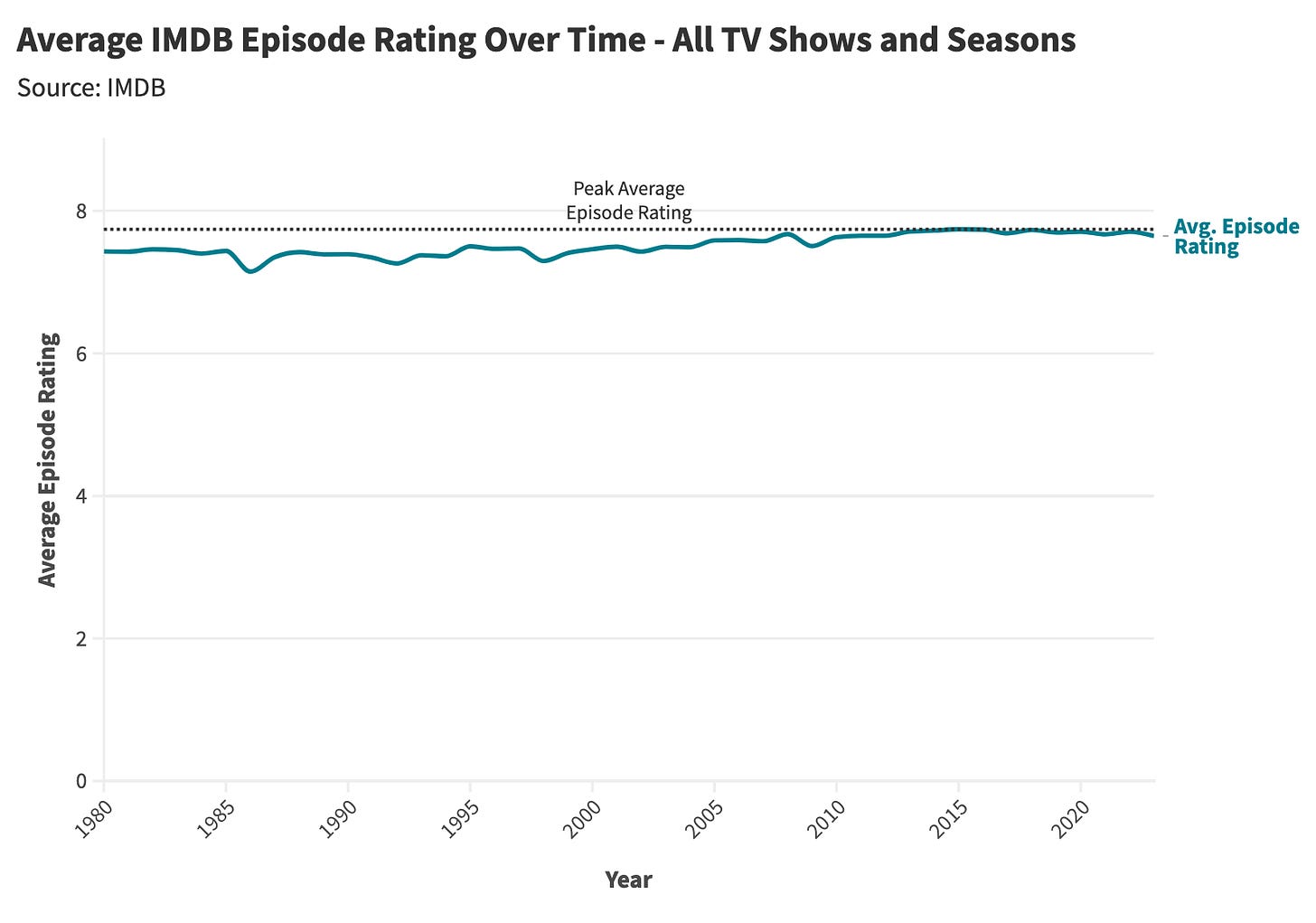
This drop in acclaim is likely due to a surge in television content production. Netflix released 891 original shows in 2022, up from 788 programs in 2021—not all of these works can replicate the artistic triumphs of Squid Game or Queen's Gambit. Focusing solely on English-language scripted shows across all networks and streaming platforms, we see a rapid increase in content production from 2009 to 2022.
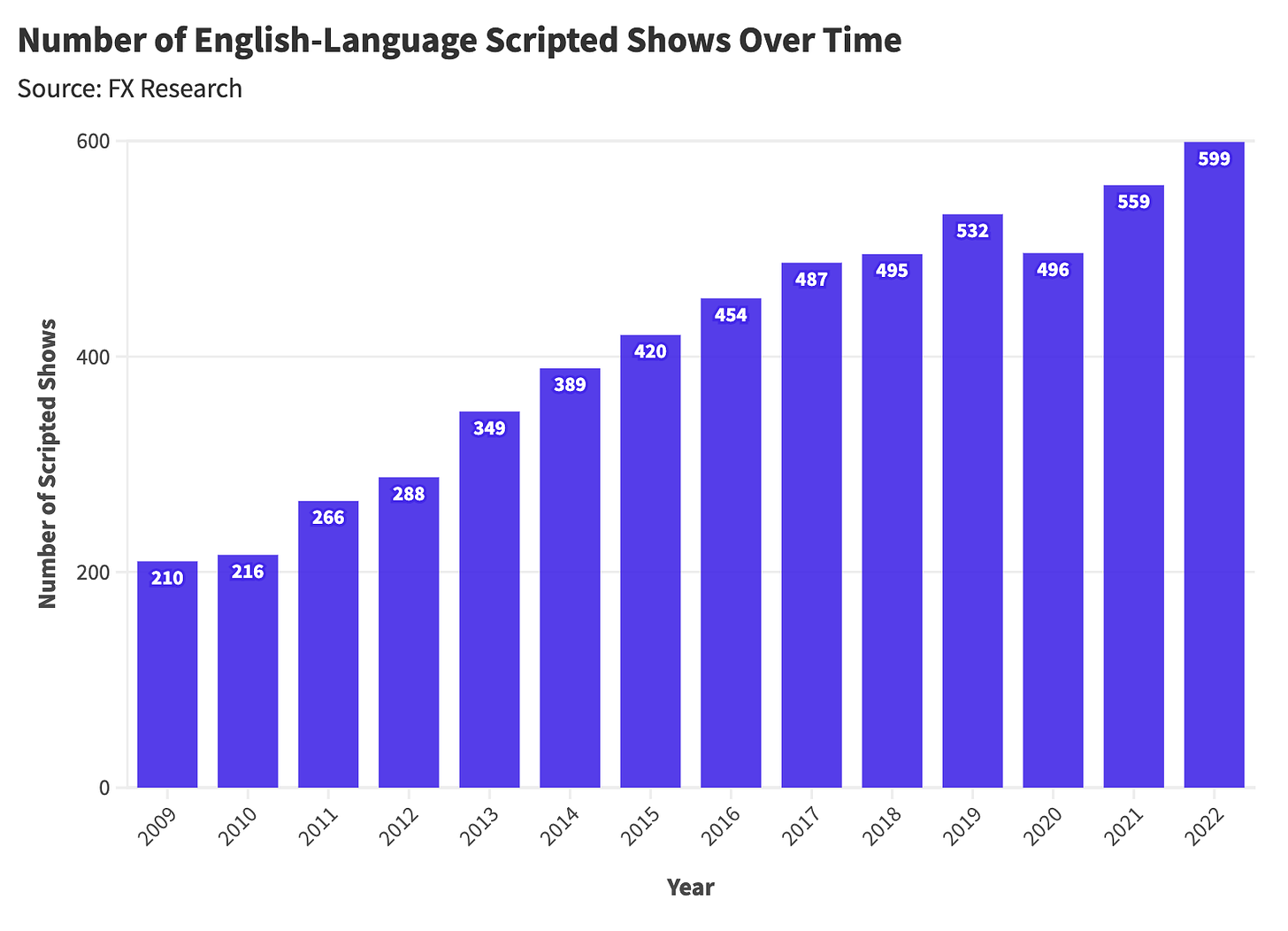
There are more shows and, therefore, more endings—some good and some terrible. Peak TV may have genuinely "peaked" in 2018, but quality has remained relatively high, especially compared to programming from the 1960s, 1970s, and 1980s. Ending a series is an inexact science that has slowly improved over the last forty years despite the magnified scrutiny and publicity surrounding recent disaster finales.
Final Thoughts: Do Finales Define a Show?
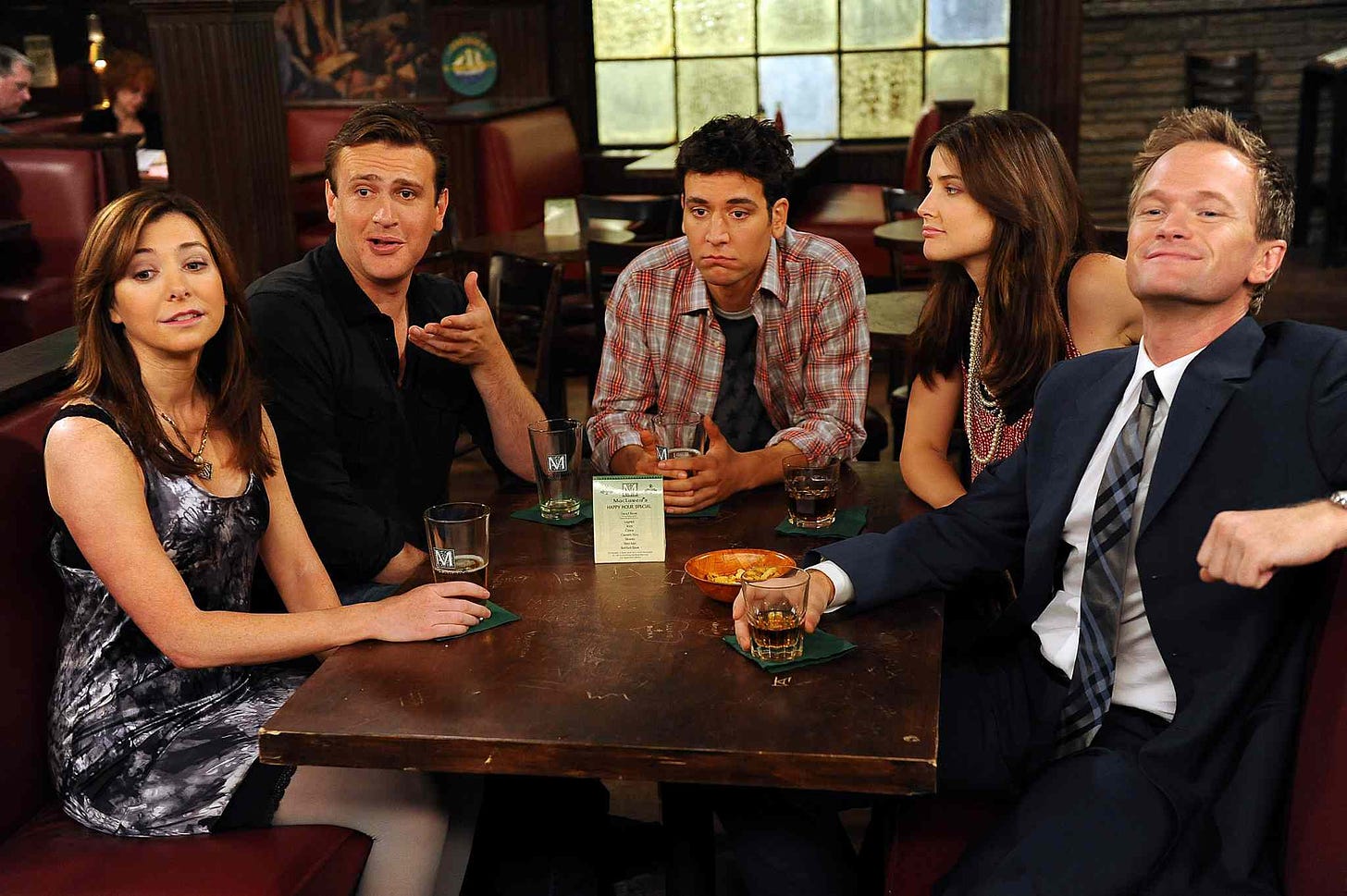
How I Met Your Mother (2005). Credit: Disney-ABC.
I recently began re-watching The Sopranos, curious to re-explore a generation-defining show a decade after my first watch. In defiance of the statistics mentioned above, I am not a big fan of the show's finale, finding it unfitting for such an ambitious work. As I made my way through The Sopranos' first few episodes, two conflicting thoughts struck me:
This show is so good.
What's the point of watching this series if it's leading to a conclusion I find unsatisfying?
Should a subpar ending recontextualize our appreciation for a series? Or is a show's finale simply one of many episodes, with no outsized impact on a series' legacy?
There was a time when I consumed procedural series like CSI, Medium, and Bones without much thought to their endpoint—a time before peak TV. Viewers were not given infinite choice—picking a show or streaming service wasn't a big to-do. I watched whatever CBS, NBC, or ABC aired, and if a show's finale was imperfect, then so what—it was better than sitting alone with my thoughts for a few hours.
In the streaming era, a series is frequently greater than the sum of its parts. Shows are often analyzed in totality, on the heels of a furious binge-watch, overlooking the triumphs of individual episodes. In some ways, television and film have converged, with TV seasons playing like four- to eight-hour movies.
At the same time, watching The Sopranos, knowing it will end with a fade-to-black, I'm struck by the short-sightedness of my long-sightedness. The early episodes are fantastic—why devalue their worth due to something that happens six seasons later? Maybe I should just enjoy each installment in isolation and stop overthinking things. Perhaps each episode is its own work of art.
Finality has value, but it shouldn't define a show's legacy. Today's media landscape has spoiled us with content abundance, and ruthlessly dissecting endings is a modern luxury.
Thanks for reading Stat Significant! Subscribe for free to receive new posts and support my work.
Want to chat about data and statistics? Have an interesting data project? Just want to say hi? Email [email protected]